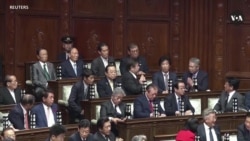What an election setback means for Japan’s longtime ruling political party.
Welcome to VOA Asia Weekly.
I'm Chris Casquejo in Washington.
That story is coming up, but first, making headlines:
North Korea said it tested its most powerful ever intercontinental ballistic missile, or ICBM. Seoul said the early Thursday launch was the longest ballistic missile test yet by Pyongyang, with a flight-time of 87 minutes. Analysts say the move could be an attempt to influence the U.S. presidential election. Earlier this week, South Korea's National Intelligence Agency said it has obtained information that North Korean troops are moving to the front lines of the war in Russia near Ukraine.
The U.S. and South Korean air forces staged joint aerial drills on Thursday in response to North Korea's missile launch. In video footage from South Korea’s Joint Chiefs of Staff, U.S. and South Korean fighter jets were seen flying in formation.
Residents in Taiwan's northern city of Keelung braced themselves on Thursday as Typhoon Kong-rey approached the island, bringing big waves, sustained rainfall and strong winds. All cities and counties in Taiwan declared a day off, financial markets closed, and hundreds of flights were canceled.
Three astronauts from China – including the country’s only female spaceflight engineer -- have arrived at the country’s orbiting space station to replace the current crew. The two crews will live and work together for several days. The new crew will conduct experiments in line with the goal to put astronauts on the moon by 2030.
Religious political parties in Bangladesh have become active in national politics since Prime Minister Sheikh Hasina’s ouster in August. Jamaat-e-Islami, the country’s biggest religious political party, was delisted and kicked out of electoral politics in 2013 when Hasina was in power. The party’s secretary general is calling for the interim government of Nobel Peace Prize winner Muhammad Yunus to call elections soon.
Japan has entered a period of political instability this week after its longtime ruling party suffered its worst election performance in 15 years. The election result casts doubt on the makeup of the next government and who will lead it. We get more from VOA’s Bill Gallo in Seoul.
Japanese Prime Minister Shigeru Ishiba hoped Sunday’s election would strengthen his leadership. Instead, his coalition fell far short of a majority, weakening his position.
As the results came in, Ishiba acknowledged the election has been a “tough ride.”
Many voters were angry over a political funding scandal and the rising cost of living.
To stay in power, the ruling LDP must now search for smaller partners.
It won’t be easy. Many opposition parties have already ruled out a coalition.
That could force the LDP into a fragile, minority government. Even if he survives, Ishiba will be weakened.
“His power and influence inside the party will be very much undermined. And I don’t think he can take any robust initiatives for his own agenda.”
Though Ishiba is seen as a foreign policy expert, he may now have to focus on political survival.
“Because of the outcome of this election, foreign policy will never be a top priority for the new government.”
Japan’s broad foreign policy direction is not expected to change. But some fear priorities will shift.
“Fewer people, both within the LDP, and across the aisle in the parliament, are keen on strengthening Japanese military power. They’re not interested as much, in raising tax revenue to help support the growing necessity for Japan to rearm itself more fundamentally.”
Most analysts predict the LDP will be able to form a government in the next 30 days, as required by law.
But with another key election in July, much more could be at stake for the party that has dominated Japanese politics for decades.
Bill Gallo, VOA News, Seoul, South Korea.
Visit voanews.com for the most up-to-date stories.
I’m Chris Casquejo.
Finally, archaeologists in Cambodia have unearthed a dozen centuries-old sandstone statues at the Angkor World Heritage Site near the city of Siem Reap, authorities said on Wednesday.
The statues — depicting so-called “door guardians” — were discovered last week near the north gate leading to the 11th-century Royal Palace at Angkor Thom, the last capital of the Khmer Empire.
Thanks for watching VOA Asia Weekly.











